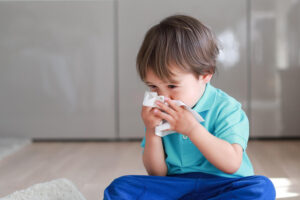
Even healthy children can experience bad breath from time to time.
Bad breath is an unfortunate — and often embarrassing issue that can affect people of all ages. In fact, even children can suffer from halitosis. If you have noticed that your little one’s breath is not as fresh as it should be, don’t panic. The most common cause of bad breath is poor oral hygiene, but there are some other possible causes. Read on to find out what could be contributing to the problem and what you can do about it.
What could be causing your child’s bad breath?

One of the most common causes of bad breath in children is poor oral hygiene. Often, young children don’t clean their teeth thoroughly enough, which causes plaque to build up and an unpleasant odour to develop. It can be difficult for little ones to clean their teeth as well as they should, which is why it’s important to provide them with guidance while they are still young.
Another possible cause of bad breath in children is dry mouth. Saliva helps keep the mouth clean, so when the body does not produce enough, issues like bad breath can occur.
Other common causes include germs on the tongue, infections in the mouth or sinuses, and mouth breathing, which can be caused by a blocked nose or a sleeping habit.
In some cases, certain foods can affect your little one’s breath as well.
Which foods cause bad breath?

The reality is that all foods can affect your child’s breath. Whenever they eat, food debris sticks to their teeth and tongue, providing the bacteria in the mouth with plenty of opportunity to produce harmful and odour-causing acids. For this reason, your little one must learn to brush their teeth thoroughly.
Certain foods contribute to bad breath more than others. Particularly pungent foods can enter the bloodstream, travel to the lungs, and then be breathed out.
Some of the most common odour-causing foods include garlic and onions as their smell tends to linger long after eating. Certain spices can also contribute to bad breath.
Tuna and other types of canned fish also tend to cause bad breath. They contain a compound known as trimethylamine (TMA), which has a distinct smell that can last for a while after eating. If your child enjoys the occasional tuna sandwich, try adding a splash of lemon to the fish before they eat it. Acidic ingredients like lemon help TMA bind to water, which lessens its potency. You can also encourage your child to brush their teeth after eating to minimise bad breath.
What are the nasal causes of bad breath?

One of the possible causes of bad breath in very young children is chronic sinusitis. If your child has this condition, you might notice symptoms like a runny nose for a prolonged period of time; coughing; nasal obstruction; and facial pain.
Often, sinusitis resolves with time, but if you are concerned about your child, it’s worth consulting with a doctor. In some cases, medication may be prescribed to alleviate the symptoms. Once the sinusitis has resolved, your child’s bad breath will likely improve as well.
Which foods freshen the breath?

There are a few foods that can help to freshen your little one’s breath. Fruits and vegetables that are high in vitamin C, such as peppers, kale, and broccoli, create an environment in the mouth that is not conducive to bacteria. To fight off bad breath, they should be eaten raw. This is because crunchy fruits and vegetables help to loosen food particles and other debris in the mouth. Make these foods readily available for your child, as they benefit overall health as well as oral health.
Some studies suggest that sugar-free yoghurt may also fight bad breath thanks to its ability to reduce levels of the sulphate compounds that cause unpleasant odours. Additionally, yoghurt also contains vitamin D, which reduces bacteria in the mouth.
If your child is old enough, they can chew on some sugar-free gum after eating. Chewing gum helps to loosen food particles from the teeth, gums, and tongue and also promotes the production of saliva in the mouth.
One of the best ways to get rid of food particles and odour-causing bacteria after eating is to drink water. Encourage your child to sip on some water after every meal and snack. Besides its ability to flush out the mouth, water also promotes saliva production and keeps the body hydrated.
How can you prevent bad breath?

The best way to keep bad breath at bay is to help your child establish and maintain a good oral care routine. Teach your little one to brush their teeth twice a day with fluoride toothpaste and a soft-bristled toothbrush. You should supervise your child while they are young, and you should make sure that they don’t swallow the toothpaste. You can also help them brush their tongues, as germs often accumulate in this area. You should ideally brush your child’s teeth before they go to bed at night. They should avoid eating or drinking anything except water until they wake up in the morning.
As well as regular brushing, it’s also important that your child cleans between their teeth by flossing every day. By getting rid of food particles, plaque, and other debris from between the teeth, it is possible to prevent bad breath.
Try to replace your child’s toothbrush every few months or as soon as you notice that the bristles have been worn down. Regular check-ups and cleanings are also helpful when it comes to keeping your little one’s oral health on track. Your dentist will let you know if there are any potential issues and provide early treatment if necessary.
If your child is old enough to use mouthwash, they could benefit from rinsing with a product that contains zinc. Chat with your dentist to find out which mouthwashes are most appropriate for your little one’s needs.
What if your child has chronic bad breath?

Fortunately, in most cases, your child’s bad breath will resolve with improved oral hygiene and a good daily routine. It is possible, however, for children to suffer from chronic bad breath, which could be caused by an underlying issue.
Certain health conditions can contribute to bad breath. Blocked sinuses and sinus infections, for example, often cause bad breath. If your child’s sinus-related issues are causing halitosis, the good news is that it should resolve with time.
Other health conditions that can cause bad breath include kidney and liver disease, some lung conditions, chronic irritation of the stomach and oesophagus, and certain autoimmune disorders.
Chronic dry mouth, a condition known as xerostomia, is often associated with bad breath. Gum disease, particularly in its more advanced stages, can also lead to bad breath.
If you have taken steps to improve your child’s oral hygiene regime but they are still struggling with bad breath, you should take them to see their dentist. Your dentist will check for any oral or general health issues that could be contributing to the issue. If an underlying cause is diagnosed, a treatment plan will be tailored to your child’s needs.
How can we help?
At Iris Dental, we love to take care of patients of all ages. We offer a comprehensive range of children’s dentistry services, as well as advice and information to help parents maintain their little one’s smiles.
If you have noticed that your child is struggling with bad breath, we urge you to bring them in to see us. We will perform a thorough oral examination and check for any potential issues that could be causing the problem. If we identify an underlying health issue, we will let you know what the best course of action is. If your child’s oral hygiene can be improved, we will offer guidance and information so that you can assist your little one in improving the condition of their smile.
Some of the children’s dentistry services that we offer include regular check-ups, orthodontic treatment, and mouthguards. To find out more about children’s dentistry at Iris Dental, please have a look here.
We also offer a comprehensive range of other dental services. These include general, cosmetic, and restorative treatments, as well as orthodontics and sedation dentistry. To find out about the full range of treatments that we offer at Iris Dental, please have a look here.
To book an appointment with our team, please get in touch here or give us a call at (03) 9394 7877.
